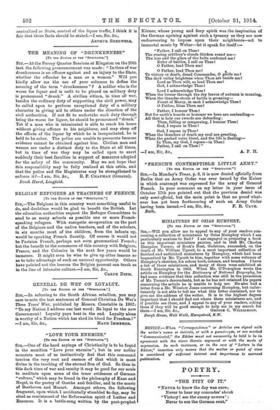THE MEANING OF "DRUNKENNESS" [To THE EDITOR OF TILE "SPECTATOR."]
SIR,—At the Surrey Quarter Sessions at Kingston on the 20th Inst. the following pronouncement was made : "In time of war drunkenness is an offence against and an injury to the State, whether the offender be a man or a woman." Will you kindly allow me the use of your columns to define the meaning of the term " drunkenness " P A soldier who is the worse for liquor and is unfit to be placed on military duty is pronounced "drunk." A civilian citizen, in time of, war, besides the ordinary duty of supporting the civil power, may be called upon to perform exceptional duty of a military character in giving aid to others under the direction of the civil authorities. If not fit to undertake such duty through being the worse for liquor, he should be pronounced "drunk.' Yet if a man who is intoxicated is able to reach his home without giving offence to his neighbour, and may sleep off the effects of the liquor by which he is incapacitated, he is held to be sober. The police are unable to prosecute because evidence cannot be obtained against him. Civilian men and women are under a distinct duty to the State at all times, but in time of war they may be called upon to exert suddenly their best faculties in support of measures adopted for the safety of the community. May we not hope that this responsibility may he fully realized at this crisis, and that the police and the Magistrates may be strengthened to


































 Previous page
Previous page